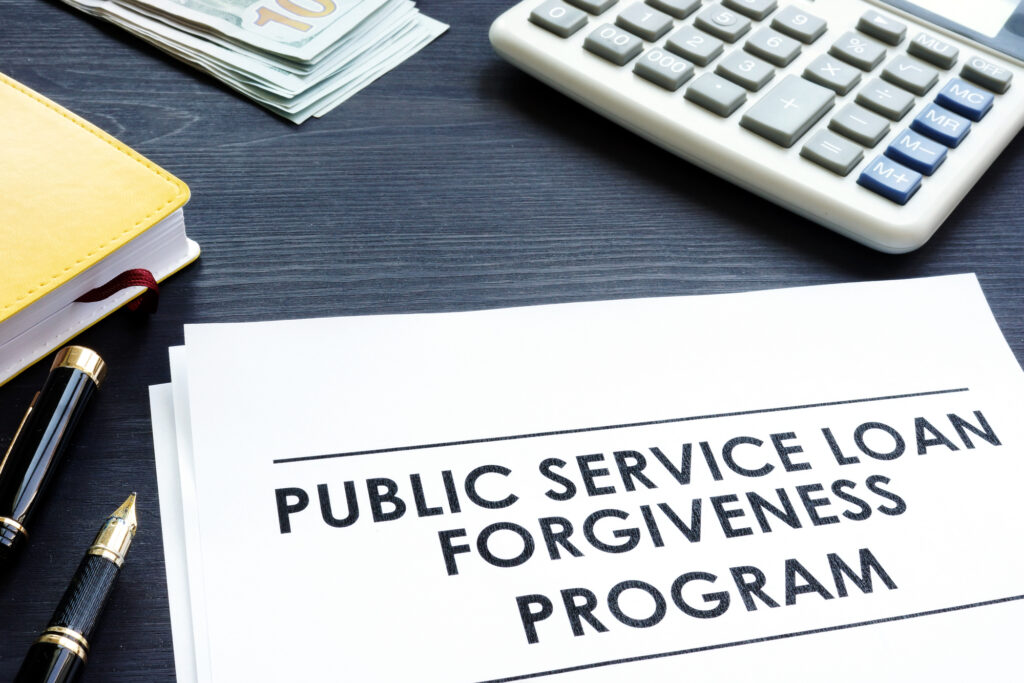The student loan pause is officially over. Interest began accruing on September 1, 2023, and payments began the following month. The first step in President Biden’s federal student loan forgiveness plan was rejected by the Supreme Court. Although there is a new student debt relief ruling process in development, you have to start payments again if you want to avoid it affecting your financial standing. Taking a “wait and see” stance could cost you. Big Time! Keep reading to learn more about:
- What are the chances of student loan forgiveness for everyone?
- What is the good news for those with student loan debt?
- How can you start moving toward forgiveness?
Do you have federal student loans, hope for forgiveness, and wish they’d just go away? Based on the news coming out of Washington and the Department of Education, forgiveness for millions of American student loan borrowers may be on the horizon. But then again, maybe not.
If you want to stop the madness, it’s time to find out where you stand with your federal student loans and deal with them (and it might be a lot less painful than you expect!). We’re here to help you understand what that means and how to get started.
Chances of General Student Loan Forgiveness
First, let’s get this out of the way right now. Student debt topped $1.7 trillion in 2023. That’s not a typo; let me repeat it – $1.7 Trillion. You’ve heard about businesses being too big to fail? Well, $1.7T is just too much debt to ignore. The amount owed is more than the national budget of a small nation. It won’t all be forgiven in one big sweep.
Second, if your school wasn’t Corinthian, DeVry or ITT Tech and it didn’t close, chances are good there’s no class action suit against it – which is how the student debt came to be forgiven in these cases.
Is There Good News for Borrowers with Student Debt?
On the upside, it isn’t an all-or-nothing situation when talking about wiping out student debt. Just because you don’t qualify for total, immediate forgiveness doesn’t mean there isn’t relief coming your way.
- There are nearly 45 million Americans with student loans.
- Nearly one-third of borrowers owe less than $10,000.
- The average student loan debt is about $31,000.
- Nearly everyone can qualify for forgiveness if they are in the right payment plan and make payments.
If you are a health care professional (nurse, doctor, etc.), teacher, government employee, work for a non-profit, or have a disability, you may qualify for student loan forgiveness. However, if you are in an Income-Driven Repayment Plan, regardless of your career, you can also qualify for forgiveness of your student debt..
What Happened to $20,000 Student Loan Forgiveness?
The approximately 8 million Pell Grant holders briefly celebrated the fact that President Biden approved $20,000 in forgiveness in 2022. What was intended to be the first student debt cancellation plan was, well… canceled. Federal judges froze the proposal by November 2022, and it was declared unconstitutional in June 2023. Although a new process for student loan forgiveness is in development, the number of borrowers affected will likely be smaller, and the soonest it could help is 2025. Here is the status of some of the other forgiveness programs:
Student Loan Forbearance Ended September 2023
Provisions for the CARES Act ended in September 2023, which means your first payment was due in October. Are you ready to make payments? If not, collecting some specific information could save you time and money (potentially lots of money) by enabling you to change repayment plans.
PSLF Limited Liability Waiver Ended October 31, 2022
Did you know that if you made payments while working for a qualified employer, you could get credit for the Public Service Loan Forgiveness program? This opportunity ended in October 2022. If you missed it you may still be able to consolidate and move to a direct loan. This could lower your payments and get you closer to forgiveness through the Income-Driven Repayment (IDR) plan.
If you have an FFEL, learn more about the forgiveness program here.

THE Student Loan Lawyer Weighs In
According to Joshua Cohen, THE Student Loan Lawyer, waiting to see what might happen to your student debt could cost you in the long run. Forgiveness is not automatic, and the government won’t act if you don’t submit the right paperwork. You might miss out on programs that end this year if you don’t act soon.
It can take weeks for the Department of Education to process paperwork under normal circumstances. Now that the student loan pause has ended, thousands of borrowers are likely to apply for forbearance, causing a bottleneck. It may increase the time to more like 60 to 120 days.
Some of the new legislation that is already approved went into effect this year and requires that you consolidate before the end of 2023. If you wait until the last minute to consolidate your student loans, you might miss the deadline and be ineligible for programs that can save you even more money. Talk to a trained student loan law attorney today and get the help you need to get back on track.
How Can I Get Student Loan Forgiveness?
While student loan forgiveness may not happen immediately, you can work toward the cancelation of your student debt. You’ll need to get some information together to get this monkey (known as student loan debt) off your back.
- Find out what type of loans you have. Go to gov and either log in or create an account. If you must reset your password, be prepared for the process to take about 10 minutes and come up with at least two passwords. What can I say? It’s a government site.
Go to the dashboard once you’ve logged in. Click in the top right corner where it shows your name and select “Dashboard.” Here, you can view the loan summary, see your balance, when your next payment is due, etc. Find out what type of loans you have and how many there are.
- Gather personal data. Now that you have specific student loan information, you’ll need to pull together some personal data, such as:
- Tax Filing Status
- Income – Last year and this year, so far
- Family Size
- Type of employment
You’ll need this information to consolidate loans, change payment plans, and learn about current programs. Although the site provides information on other payment options, it doesn’t tell which ones are best for you long-term, and it also doesn’t explain the ramifications of your decisions.
Talk to a Trained Student Loan Lawyer
Student loans and student debt are big news, and their legislation has a lot of fine print. Many states are adding forgiveness programs for certain professions, such as teachers, government workers, healthcare professionals, etc. An analysis from a student loan lawyer in your area can help you understand how new legislation and programs affect you. A specially trained student loan law professional can:
- Help you get on a repayment plan that fits your budget and helps you move toward forgiveness
- Tell you about different state and federal forgiveness programs you might qualify for
Many student loan lawyers offer clients a free review. This means that you know they can help you before they take your case.
Your student loan servicer is the organization that sends you the monthly student loan statements. This is the first place most people go to learn more about their student loan forgiveness options. Although it’s free, the people who answer the phones are not legal specialists. They work for the organization and provide the options they are trained to offer. They may or may not understand the consequences of their recommendations or include the program that is best for your financial future.
Ready to get started? Find a student loan lawyer near me
Student loans are an integral part of the practice for trained student loan lawyers. Many of these professionals also have experience in a variety of different legal areas, from estate planning to bankruptcy. This means they can help you understand how your student loans affect those areas of your life as well.
